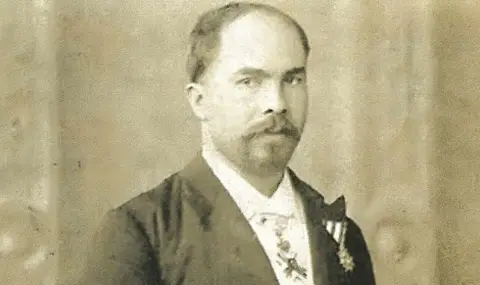On May 31, 1894, the young Bulgarian democracy learned an important lesson - the prime minister did not must bluff his resignation.
After seven years in power, Prince Ferdinand I surprisingly accepted Stefan Stambalov's resignation as Prime Minister and commissioned Konstantin Stoilov to form a cabinet.
The fall of Stambolov was received with surprise by the then public, because during the seven years as prime minister, he resigned 14 times before the monarch.
Meanwhile in Vienna, Prince Ferdinand I receives support for removing Stefan Stambolov from power.
He shares this intention with Austro-Hungarian Foreign Minister Kalnoki, and with some foreign diplomats. He also made inquiries in front of the Russian ambassador in Vienna, Prince Lobanov-Rostovsky, thus preparing the ground for a change in bilateral Bulgarian-Russian relations.
There are few statesmen in Bulgarian history who can have such a key importance for the development of the country as Stefan Stambolov. Called by his contemporaries the “Bulgarian Bismarck”, Stambolov took over the management of a young Balkan state torn by internal strife and placed in international isolation, which was fighting to preserve its fragile independence.
One of the first tasks faced by Stefan Stambolov is the modernization and revival of the Bulgarian economy, which is in a period of collapse. The lack of a comprehensive strategy in the course of the complex political struggles that accompanied the first years of the development of the Principality of Bulgaria seems to have left it in the background.
Stefan Stambolov, however, becomes the person who gives the much-desired strategy and development concept.
He gave the beginning of the Bulgarian state protectionism,
following three main directions during the eight years during which he was at the head of the state - promotion of Bulgarian production through an active protectionist policy, attraction of foreign capital, and above all the regulation of trade relations with other countries, in a framework favorable to Bulgaria .
It was Stambolov who advocated the normalization of relations with the Ottoman Empire. The goal is for Bulgaria to get an opportunity to take care of the Bulgarians under Ottoman rule.
On March 8, 1894 – The Principality of Bulgaria and the Ottoman Empire settled the dispute over the operation of the railway lines from Vakarel to Saranbey by leasing them to the Bulgarian government.
Srefan Stambolov delayed the signing of the agreement for more than a month until the High Gate gave in to his demands for the autonomy of Bulgarian schools in Macedonia.
On April 12, 1894, the Sultan issued berets for Bulgarian bishops in the diocese of Veleshka and Nevrokop.
In domestic politics, Stefan Stambolov is also famous for the repression against the opposition and newspapers critical of his government.
Stefan Stambolov supports measures of violence and election fraud.
On October 5, 1888, Stambolov's government took a loan from Great Britain worth nearly 47 million gold leva at 6% interest. The proceeds were used for the purchase of the Ruse railway line – Varna by its English owner.
This is the Principality's first loan abroad. By 1892, the total value of the taken loans exceeded 217 million gold leva.
The money is used to build the road and railway infrastructure, strengthen the army and develop the native industry.
During Stambolov's rule, dozens of factories were built.
The number of larger enterprises has doubled, but, as before, they meet only 14% of the country's needs.
The construction of modern for its time ports in Varna and Burgas also began, and in 1892 the “Bulgarian Commercial Steamship Company” was established. Stambolov marks the beginning of today's famous Plovdiv Fair.
Coming into conflict with Tsarist Russia and Prince Ferdinand, he was assassinated by political enemies on July 6, 1895.
However, Stefan Stambolov remains in history as a Bulgarian revolutionary, politician and statesman.
He took an active part in the Staro Zagora (1875) and the April Uprising (1876). He is among the most deserving and popular "builders of modern Bulgaria".
After the Liberation, he was one of the active members of the Liberal Party. He was the chairman of the National Assembly; Prime Minister of Bulgaria (1888-1894). He has merits in bringing about the Union of the Principality of Bulgaria and Southern Rumelia and in the counter-coup in 1886.
His policy during the Unification and the crisis after the coup of 1886 proved to be decisive for the stabilization of the country and its separation from dependence on Russia. Conducts a clearly manifested nationalist policy.
Publishes together with Hristo Botev a collection of poems. This happened in the fall of 1875 in Bucharest.
